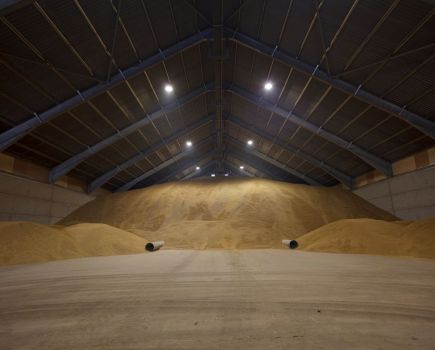Highlighting the significance of small scale and global cooperation to tackle climate change in a sustainable way, the annual Oxford Farming Conference returned as an in-person event for the first time in three years. CPM attended the conference to get the lowdown.
“What we must do is radically collaborate.”
By Melanie Jenkins
Kickstarting the New Year, the Oxford Farming Conference, held on 4-6 January, presented a clear message that the world must work collaboratively to tackle climate change now, be that through the incremental steps made by individual nations, farming incentives or through global trade deals and international law.
Taking to the stage, Defra farming minister Mark Spencer detailed the Government’s plans to focus on more a sustainable, resilient food system to feed the growing population and halt the decline of nature. “We’ve got to keep everyone fed and save the planet at the same time. In my book, those are two sides of the same coin. We must work together and it’s as simple as that.”
Announcing changes to the Sustainable Farming Incentive (SFI), Mark dedicated a new £20/ha payment for the first 50ha, up to £1000, to cover the cost of taking part in the scheme. “This is in addition to the payments you’ll receive for the work you do to improve your farm and the environment.” This additional payment is available to all new and existing adopters.
Mark stated that SFI has been made more accessible to tenant farmers by offering them a three-year agreement instead of five and by allowing tenants on shorter contracts to enter into the scheme without requiring their landlord’s consent.

Countryside Stewardship payments have been revised upwards, on average by 10% for all new and existing Mid and Higher Tier agreements.
He also detailed updated payment rates for Mid and Higher Tier Countryside Stewardship schemes which will apply to new and existing agreements, with an increase in payments averaging around 10%. Following pressure from farming lobby groups, a further announcement was made in mid-January that the rates for capital items in agreements starting from 1 January 2023 onwards which marked a government u-turn as capital rates were to remain unchanged.
The Farming Investment Fund will also see a further round of grants awarded for 2023, says Mark. “This will help you make investments to your business through equipment, technology and infrastructure.”
The Government has also released 45,000 visas for seasonal workers, with the possibility of an extra 10,000. “Looking forward we must have a strong and more structured way of providing the industry with the labour it requires,” says Mark.
But shadow farming minister, Daniel Zeichner, questioned whether the announcements would be enough to change the fortunes of farmers given the current challenges they face. “Welcome though some of it sounds, it seems relatively small scale and doesn’t look to be much more than inflation uprating. Only time will tell whether it’s going to be enough to encourage many farmers to participate.”
Taking to the stage, Baroness Kate Rock, chair of the Tenancy Working Group, drew attention to the important role tenant farmers play in producing quality food, sequestering carbon, cleaning rivers and restoring wildlife. She stressed that it’s vital tenant farmers have access to the financial incentives to continue to do so.
Detailing how tenant farmers incorporate regenerative agriculture into their businesses, she stressed this can take years, have yield penalties and associated costs. “We must have a modern take on those clauses that will reward good stewardship and natural capital. The positive benefits of moving to and operating a regenerative system can take many years, certainly more than the average length of Farm Business Tenancies, which is now less than four years.
“The SFI is meant to support farmers to make this transition. However, the scheme cannot lengthen the terms of a tenancy, meaning farmers have to work within their existing tenancy structure,” she explains.
Kate highlighted that tenancies have shrunk from being multi-generational post-war, to currently just over three years. “Even when agreements are assumed to roll over on a year-to-year basis, there’s no guarantee of continued occupation into the long term. A landlord can serve a notice to quit at any time. Sadly, this has consequences for the management of the natural capital assets as a holding. So even if a tenant wants to take actions to move to a regenerative system, they aren’t incentivised to do so within a short-term planning horizon.
“So we must move to a state where agricultural tenancy is characterised by long-term agreements. And we have to seriously consider further structural changes so that tenanted land can play its role in a regenerative future,” she says. “Issues around biodiversity, management of carbon and other ecosystem services in the context of using land for food production and for nature should become part and parcel of a new definition of agriculture.”
And environmental legislation impacting both the tenanted and owned farming sectors could soon be directed by international criminal law. “Environmental law is rapidly gaining momentum,” says Jojo Mehta of Stop Ecocide International. “The true function of criminal law is to protect and there’s a deeper moral sense that the destruction of ecosystems is wrong and dangerous, and the current legal system doesn’t fully acknowledge this. But there’s an appetite for the gravest harms to nature to be recognised in law.”
She estimated that in around three to five years ecocide could be recognised by the International Criminal Court to act as a safeguard for the future of the living world. “No amount of voluntary agreements and pledges can provide a safeguard, but the framework offered by criminal law is potentially transformative.
“So what do we mean by ecocide? Ecocide means unlawful, or wanton acts committed with knowledge that there’s a substantial likelihood of severe and either widespread or long-term damage to the environment being caused by these acts.”
Although this doesn’t target any particular industry, it addresses the level of harm or hazard whatever the activity and the definition has landed well in the political world, according to Jojo.
“It’s also inspired domestic proposals in a number of countries – most prominently in Belgium, where the government recently announced it intends to legislate nationally on ecocide.
“And perhaps most powerfully, this definition speaks to common sense. We are all on the same ship. The only planet that we’re aware of that can sustain life as we know it. We can also see from a practical perspective that it’s nothing less than necessary if we want the soils and seas of our planet to be producing healthy food for our children and our grandchildren,” she adds.
But as things currently stand, the UK is still working towards its 2050 net zero target, says Kyle Lischak of ClientEarth. “We were involved earlier last year in a court case, which the Court held in our favour that the UK Government must do more in terms of detail around its net zero plan.
“It’s notable, as well, that the Committee on Climate Change comments in its most recent reports that there’s still a policy gap around agriculture and climate that must be addressed,” he says.
“The other thing that’s really hot off the press and quite interesting is the Environment Act 2021, which is a post Brexit approach to setting environmental governance and broader environmental law framework in the UK, which includes a 25-year plan,” he explains.
The plan is vitally important as it sets out how the country will move forward regarding the environment and is where the phrase ‘public money for public goods’ comes from. “It details improved regulatory baselines for water and air pollution from agricultural sources, but the devil’s in the detail and there’s questions around implementation and progress.”
Kyle highlighted that there’ve been u-turns and hesitations on the Government’s part and that it’s still unclear how previous financial incentives to farmers will be fully replaced or replicated. “And importantly, how these will link up to policy and targets. It’s all still a bit vague and there’s been abysmal implementation of law and enforcement.”
The further issue looming is the revocation of retained EU law at the end of December this year. “The ‘sunset clause’ basically means that if law inherited from the European system isn’t dealt with by government in some way before December, it just drops off the face of the earth. And that’s not just related to the environment and agriculture, but to a whole slew of things that are in the public and business interest,” warns Kyle.
So what should happen to change this. “We must have government leadership across this. We require a clear, fair and proportionate regulatory baseline that deters pollution and establishes a living and level playing field amongst market participants,” he adds.
And it appears the devolved nations have perhaps been better at supporting agriculture and the environment than the UK government, according to Jane Davidson, author of #futuregen: Lessons from a Small Country and previous Wales environment minister.
“This is about system change, because unless we have this, we’re not going to be able to make the adjustments in order to fully tackle the climate and the biodiversity crises.” To achieve a system change, a new set of values had to be established for how the Welsh Government did business. “That set of values is the Wellbeing of Future Generations Act which came out in 2015,” she says.
“And now we are the only country in the world that has a legislative mechanism to deliver on the sustainable development goals by 2030. From the Act, what you will see is redefining prosperity as innovative, productive and low carbon, looking at resilience in terms of enhancing biodiversity, considering health, not in terms of ambulance waiting times, but what government can do to keep its people healthy.
“And being globally responsible means that you don’t offshore your negative effects. You have to deal with them at local level,” she stresses.
So what does this mean at this moment in time in terms of current government commitments, she asks. “The Agriculture Bill is focused on sustainable land management. It’s about how we produce food and other goods in a sustainable manner, mitigate and adapt to climate change, maintain and enhance the resilience of our ecosystems, but also about conserving and enhancing the Welsh countryside and culture.”
To further its sustainability targets, Wales is looking to move its net zero goals to 2035. “Because if we can move more quickly then we add a benefit, not just to Wales but to the UK and to the rest of the world,” says Jane. “The lesson from a small country is be ambitious. Find your identity, your culture, your heritage and drive that towards regenerative farming.”
And although Wales may be leading the way, sustainable agriculture is of global significance and has to be driven by trade, according to Jason Hafemeister of the USDA. “In the US, we think farmers globally are at the intersection of two existential challenges: how do we feed a growing population and do it without burning up the planet.”
But, he admits, farmers won’t adopt new practices to tackle these challenges if the new techniques – like genetically edited crops – they use are banned in a world market. “So trade has to be the incentive to farmers adopting these new ways of doing things, and the market will encourage the right kind of practices.
“We do want to see a global market that is creating an opportunity and an encouragement for farmers to make these investments,” says Jason.
“But we also know that sustainability requires economic sustainability. Farmers have to stay profitable to make these investments, so we want to find an enabling environment to encourage them to jump into that world.”

Trade deals could help innovative investment if they don’t entirely focus on market access but instead look at regulatory cooperation.
However, it’s important that trade deals do encourage this, according to Kimberley Botwright of the World Economic Forum. “They must be balanced and shouldn’t entirely focus on market access but look at regulatory cooperation. So we must have conversations around similar mutual recognition, setting standards to align on, co-agreeing to reduce subsidies in set timeframes to level out the playing field.”
This could involve governments addressing disparities around carbon accounting or lowering tariffs and non-tariff barriers on renewable energy, she says. “This will filter down into the costs for you when buying inputs and applying that technology to your business.
“We should be advocating for the stability of a rules-based system today, through the WTO and existing free trade agreements that surround that,” adds Kimberley.
Also advocating collaboration as a means to tackling climate change and food system solutions, Cynthia Rosenzweig of NASA and co-found of the Agricultural Model Intercomparison and Improvement Project (AgMIP), highlighted this as the most significant environmental challenge of the time.

A key theme of the Oxford Farming conference was collaboration and how it can help tackle both food security and climate change.
“Whatever farmers are growing around the world, climate change will be affecting different regions and different crops,” she says. Madagascar, Pakistan and Chile are already experiencing severe climate induced crises and even the UK suffered a heatwave last summer, highlighted Cynthia.
“Climate change is no longer way in the future, it’s happening now. So what we must do is radically collaborate. Take a food system approach that links the climate system, ecosystems, nutrition and sustainable development pathways.
“I think we must keep a laser focus on climate change solutions for food system stakeholders,” she says. “With an integrated emphasis on a reduction of greenhouse gases, adapting to the changing climate conditions, including the extremes and sustainability, not only for the environment, but for the livelihoods of all farmers across the world.”
Cynthia also believes that the way forward is to conduct radically cooperative multiscale assessments of solutions, including resilience to climate disasters. “This provides the evidence base for policy and decision makers to scale up and create programs to build on the solutions that the researchers come forward with.”
This article was taken from the latest issue of CPM. For more articles like this, subscribe here.




